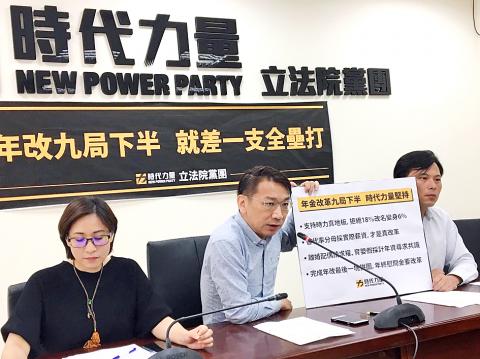The Executive Yuan should not monetarily reward retired public servants at next year’s Lunar New Year holiday, because such payments lack a legal basis and run counter to efforts to push for pension reform, the New Power Party (NPP) said yesterday.
As the first cross-caucus negotiation round drew to a close yesterday, the NPP held a news conference in Taipei to promote its pension reform platform.
Referring to a directive issued last week by Premier Lin Chuan (林全) to continue paying holiday bonuses to former public servants whose monthly pension is less than NT$25,000 (US$822.34), NPP caucus convener Hsu Yung-ming (徐永明) said the NT$25,000 threshold was set by the Executive Yuan to justify the payments as they are not stipulated in any law.

Photo: CNA
The Executive Yuan last year resolved to stop issuing holiday bonuses to retired civil servants receiving a pension of more than NT$25,000 for the Lunar New Year, the Dragon Boat Festival and the Mid-Autumn Festival.
The rule change is expected to save the government NT$870 million annually.
Lin’s order triggered speculation that the government is attempting to appease civil servants to avoid intensifying the already strong opposition to pension reform efforts.
During the regular legislative session, which wrapped up last month, the NPP proposed that the budget for holiday bonuses be slashed, but the proposal was vetoed, Hsu said.
The Executive Yuan should scrap the plan to bring its policy in line with pension reform efforts, he said.
NPP Executive Chairman Huang Kuo-chang (黃國昌) also called for the “total abolition” of the 18 percent preferential interest rate on savings accounts for retired public servants hired before 1995.
According to a draft put forward by the Presidential Office’s Pension Reform Committee, this group of pensioners — who under the old pension system had claimed their pension in full — would still receive a 6 percent interest rate after a proposed civil servant pension bill is passed, in addition to a proposed bottom limit for pensions received by public servant, set at NT$32,000.
“We understand that some retired civil servants need to be taken care of, but that is covered by the ‘bottom limit,’” Huang said.
The NPP has proposed setting the lower limit for civil pensions at NT$22,208, the median value of people’s disposable income, he said.
Huang called on legislative caucuses not to leave any “loose ends” by allowing former civil servants to keep a 6 percent interest rate, saying that otherwise they would only be going halfway on reform efforts.

Japanese footwear brand Onitsuka Tiger today issued a public apology and said it has suspended an employee amid allegations that the staff member discriminated against a Vietnamese customer at its Taipei 101 store. Posting on the social media platform Threads yesterday, a user said that an employee at the store said that “those shoes are very expensive” when her friend, who is a migrant worker from Vietnam, asked for assistance. The employee then ignored her until she asked again, to which she replied: "We don't have a size 37." The post had amassed nearly 26,000 likes and 916 comments as of this

US President Donald Trump said "it’s up to" Chinese President Xi Jinping (習近平) what China does on Taiwan, but that he would be "very unhappy" with a change in the "status quo," the New York Times said in an interview published yesterday. Xi "considers it to be a part of China, and that’s up to him what he’s going to be doing," Trump told the newspaper on Wednesday. "But I’ve expressed to him that I would be very unhappy if he did that, and I don’t think he’ll do that," he added. "I hope he doesn’t do that." Trump made the comments in

Tourism in Kenting fell to a historic low for the second consecutive year last year, impacting hotels and other local businesses that rely on a steady stream of domestic tourists, the latest data showed. A total of 2.139 million tourists visited Kenting last year, down slightly from 2.14 million in 2024, the data showed. The number of tourists who visited the national park on the Hengchun Peninsula peaked in 2015 at 8.37 million people. That number has been below 2.2 million for two years, although there was a spike in October last year due to multiple long weekends. The occupancy rate for hotels

A cold surge advisory was today issued for 18 cities and counties across Taiwan, with temperatures of below 10°C forecast during the day and into tonight, the Central Weather Administration (CWA) said. New Taipei City, Taipei, Taoyuan and Hsinchu, Miaoli and Yilan counties are expected to experience sustained temperatures of 10°C or lower, the CWA said. Temperatures are likely to temporarily drop below 10°C in most other areas, except Taitung, Pingtung, Penghu and Lienchiang (Matsu) counties, CWA data showed. The cold weather is being caused by a strong continental cold air mass, combined with radiative cooling, a process in which heat escapes from